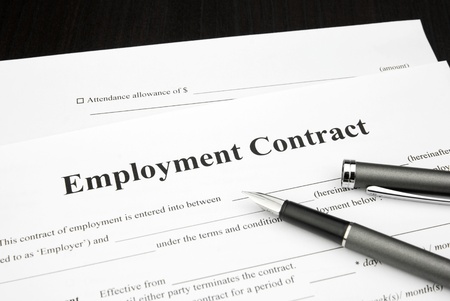 There are not many things an employer can do to prevent unfettered competition by a former employee. B&P Section 16600 states that “every contract by which anyone is restrained from engaging in a lawful profession, trade, or business of any kind is to that extent void.” The statute provides three exceptions, none of which apply to the typical employer/employee relationship: (1) a person who sells the goodwill of a business or sells substantially all of its operating assets may lawfully agree to refrain from carrying on a similar business; (2) a partner may, upon the anticipation of the partnership dissolution or disassociation from the partnership, lawfully agree not to carry on a similar business; and (3) any member of a limited liability company may lawfully agree not to carry on a similar business.
There are not many things an employer can do to prevent unfettered competition by a former employee. B&P Section 16600 states that “every contract by which anyone is restrained from engaging in a lawful profession, trade, or business of any kind is to that extent void.” The statute provides three exceptions, none of which apply to the typical employer/employee relationship: (1) a person who sells the goodwill of a business or sells substantially all of its operating assets may lawfully agree to refrain from carrying on a similar business; (2) a partner may, upon the anticipation of the partnership dissolution or disassociation from the partnership, lawfully agree not to carry on a similar business; and (3) any member of a limited liability company may lawfully agree not to carry on a similar business.
Those exceptions are not realistic business models for most companies. California courts will carefully scrutinize business structures that ostensibly fall within one of the exceptions to determine whether structures are shams created to circumvent B&P Section 16600.
Outside of the three limited exceptions, one option to prevent an employee from leaving to work for a competitor is to enter into a term agreement for employment with the employee, though such an agreement may not be desirable. Employment in California is generally “at-will,” which means that employment may be terminated by an employer for any lawful reason, at any time. However, an employee who has a specified term agreement is less likely to be recruited by a competitor because doing so may lead to liability against the competitor for interference with or inducing a breach of, a contract. Moreover, if the employee breaches his or her employment agreement by leaving before the term has ended, the employer would have a claim against the employee for breach of contract unless the employee can show a willful or permanent breach by the employer. But even with a term agreement, unless the employee has unique talents (such as a professional athlete or entertainer), the employer would still be unable to enjoin the employee from working for a competitor. Although the contract for a specified term provides more security for the employer against an employee leaving and competing, it also means that the employee may be terminated only if the employee commits a willful breach of duty, engages in habitual neglect of duty, or is incapacitated and cannot perform.
If an employer is not interested in divesting itself from the at-will nature of employment, another option to induce continued employment is to provide deferred compensation as an incentive to remain employed over a number of years. An employer may offer stock with strings attached, such that an employee who resigns may be required to forfeit his or her unvested restricted stock. Another alternative for high-level employees is to provide deferred compensation in a retirement plan that is subject to the Employee Retirement Income Security Act (“ERISA”) and to include noncompetition or restrictive covenant language in the plan. Because ERISA preempts state law, it may be another means of avoiding California’s restrictive covenant restrictions. This issue has not been tested under California law.
Covenants not to solicit employees may offer some protection against competition, but the protection actually provided is uncertain at best. Prior to the seminal California Supreme Court decision re, employee non-solicit provisions were generally considered enforceable. Edwards established a broad interpretation of B&P Section 16600, but the issue of employee non-solicits was not before the Court and the Court stated in a footnote that it would not address the issue.16 No California appellate court decision has addressed employee non-solicits since 2008, but many practitioners believe that, following Edwards’s expansive view of Section 16600, there is a reasonably good chance that employee non-solicits will be unenforceable as well. Presently, there is appellate court authority holding that employee non-solicits are valid; thus, it is unlikely that terminating an employee for refusing to sign such a covenant (or declining to hire an employee for refusing to do so) would create the same litigation risk as terminating or refusing to hire an employee for not signing an agreement that contained an unenforceable non-competition provision. Nonetheless, employee nonsolicit provisions still carry some risk and have limited upsides.
As discussed in the fourth article of this Take 5, while an employer may not compel the enforcement of a choice-of-law or choice-of-forum provision in an agreement with an unrepresented employee, Labor Code Section 925 expressly excludes agreements with employees who are “in fact individually represented” if the employee’s lawyer is involved in negotiating the terms of the forum selection or choice-of-law clause applicable to employment disputes. This carve-out means that high-level employees, who are often represented in negotiating their employment agreements, may be validly bound to choice-of-law or forum selection provisions that open the door to restrictive covenants if they are represented in the negotiation of their employment agreements.
In summary, there is very little that an employer can do contractually to limit competition in California; however, there are mechanisms that an employer may utilize to strengthen the longevity of its relationship with its employees. Nevertheless, an employer’s focus should be on ensuring that proper measures are taken to protect trade secrets, as discussed in the first article of this Take 5.

![[IPWatchdog Logo]](https://ipwatchdog.com/wp-content/themes/IPWatchdog%20-%202023/assets/images/temp/logo-small@2x.png)


![[Advertisement]](https://ipwatchdog.com/wp-content/uploads/2024/04/Patent-Litigation-Masters-2024-sidebar-early-bird-ends-Apr-21-last-chance-700x500-1.jpg)

![[Advertisement]](https://ipwatchdog.com/wp-content/uploads/2021/12/WEBINAR-336-x-280-px.png)
![[Advertisement]](https://ipwatchdog.com/wp-content/uploads/2021/12/2021-Patent-Practice-on-Demand-recorded-Feb-2021-336-x-280.jpg)
![[Advertisement]](https://ipwatchdog.com/wp-content/uploads/2021/12/Ad-4-The-Invent-Patent-System™.png)







Join the Discussion
One comment so far.
Night Writer
July 9, 2017 05:40 pmWhat a nightmare. The rise of the trade secrets and the fall of the patent.